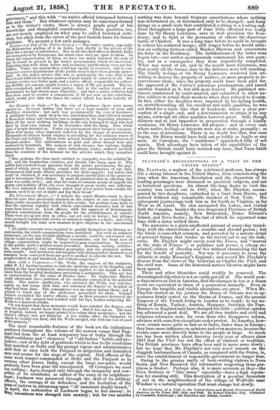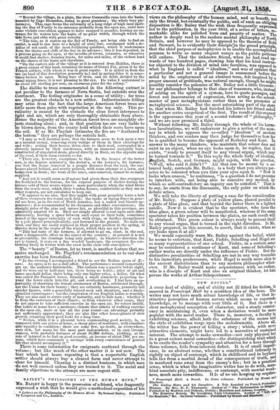PLAYFAIR'S RECOLLECTIONS OF A 'VISIT TO THE UNITED STATES. * Mn.
PLAYFAIR, a nephew of the celebrated professor, has always felt a strong interest in the United States, from remembering the time when the American Revolution and the characters of its leading personages were discussed as practical subjects, and not as historical questions. An almost life-long desire to visit the country was carried. out in 1847, when Mr. Playfair, accom- panied by two daughters, embarked in a liner from Havre, and arrived without any remarkable incident at New York. His subsequent journeyings took him as far South as Virginia, as far West as St. Louis. He also navigated the Lakes, and visited both the Canadas, besides the less frequented Provinces of British North America, namely, New Brunswick, Prince Edward's Island, and Nova Scotia ; in the last of which he sojourned some time with a sister settled there.
The narrative is a plain unaffected account of every-day travel-
ling, with the observations of a sensible and shrewd person ; but the whole is somewhat common, and pervaded by a minute detail of personal doings that border on the trivial not to say the ludi- crous. Mr. Playfair might surely read. the Times, and "marvel at the state of France " ; or purchase and peruse a (cheap re- printed) edition of Dombey and Son without chronicling the fact for the benefit of posterity. Nor was it necessary to cross the Atlantic to study liacaulay's England ; and record Mr. Playfair's dissent from the views of the historian on Charles the First and the civil war. Some of the historical notices likewise might have been spared.
These and other blemishes could readily be removed. The
chronological objection is not so easily got rid of. The world now- a-days moves so fast in America, that the changes in ten or a dozen years are equivalent to those of a generation formerly. Even in Europe the tangible and visible alterations are great. When Mr. Playfair started on his journey the House of Orleans was to ap- pearance firmly seated on the throne of France, and the present Emperor of the French living in London as he could ; to say no- thing of Russia, Turkey, Austria, Hungary, Sardinia, the Pope. Manners in England may have changed but little ; political opinion has advanced a good deal. We are all free traders and civil and religious reformers now, for even those who disapprove reform, advance with some few exceptions under protest. In America, how- ever, events move quite as fast as in India, faster than in Europe; they have more influence on opinions and even manners, because the events come more directly home to the people at large. So much too has been written about America every year or oftener since 1847 that the Visit has not the effect of contrast or tradition. The British provinces have often been said to move more slowly ; but we hope that Mr. Playfair's not very novel remark on the sluggish backwardness of Canada, as compared. with the States, is, since the establishment of responsible government no longer true.
Owing to the greater rarity of book-writing visitors to Nova Scotia and New Bruswick the information respecting those pro- vinces is fresher. Perhaps also, it is more accurate as they—the Nova Scotians or "blue noses" especially—have a high reputa- tion for standing still. This description of a peculiar formation of soil in the neighbourhood of the village of Wolfville near Windsor is a natural operation that must change but slowly.
• Recollections of a Visit to the United mates and British Provinces of North America, is the Years 1847, 1848, and 1849. By Robert Playfair, Esq. Published by Constable, Edinburgh ; and Hamilton and Adams, London. " Beyond the village, in a plain, the river Cornwallis runs into the basin, :bounded by Cape Blomedon' rising in great grandeur ; the whole very pie- turesque. Tina cape forms the extremity of a long ridge of high land skirt- ing the Bay of Fundy to its entrance probably from the open sea, until here some violent convulsion appears to have snapped it asunder, leaving an en- itermce for its waters into the basin of no great width, through which the -tide flows and ebbs with great velocity. "The tide, as it rushes up the Bay of Fundy., not being able to find an ...outlet, is said to rise here to a height of sixty feet, surcharged with a de- tritus of red earth of the most fertilizing qualities, which it undermines from the shores and cliffs of the bay in its advance; this it has deposited, in -a process going on for ages, at the mouths of rivers, estuaries, or wherever it could find shelter, forming tracts, for miles and miles, of the richest land ou the shores of the basin and elsewhere.
"On the eastern side of the village as it is entered from Halifax, there is a great extent of this land, retaining its name of Grand Pre, given it by the French settlers with whom it was in great repute. It is dyked in from the ' sea (as land of this description generally is,) and in spring-tides it is some- ' times broken in upon. Being bare of trees, and its fields divided by the usual zigzag fence, it is not pleasing to the eye. Its value I understood to be about 16/. sterling per acre, an enormous price for the colony."
The dislike to trees commemorated in the following extract is not peculiar to the farmers of Nova Scotia, but extends over the Continent. The feeling originates in a sense of utility ; for trees • are the greatest obstacle to a new settler Indiscriminate felling may arise from the fact that the large American forest trees are Jittle more than poles with vegetation at the top only. This pe- culiarity is caused by the obstacle the close forest interposes to • light and air, which are only thoroughly obtainable from above. _Hence the majority of the American forest trees are unsightly ob- jects standing alone ; and, in that position too are very liable to be blown down, from the scanty hold which their roots have upon the soil. If as Mr. Playfair intimates the firs are "feathered to ,the bottom" they are perhaps the outside belt.
"I may as well mention here, that the farmers seem to look upon a tree as a natural enemy, removing every vestige of them in their clearings far and wide; settino•' their houses down close to their road, surrounded in a slovenly manner by their out-houses, with an immense unsightly barn, 'constructed of unpainted deals, placed directly in front, on the opposite side of the road, if their farm extends so far. "There are, however, exceptions to this. In the houses of the better sort, in the Baptist minister's, the doctor's' or the lawyer's, for instance, you find the house removed to a proper distance from the road, the out- houses placed behind, and neatly painted, with some attempt at a lawn and hedge-row in front ; the want of the trees, once removed, cannot be so easily .supplied.
'And yet it would seem as if nature had given them their fine evergreen firs feathered to the bottom, for the express purpose of shelter during the intense cold of their severe winter; more particularly when the wind blows from the north-west, which their wooden houses, comfortable as they are in other respects, are not calculated to keep out.
"It appears to me also, that they might with great propriety leave a belt of these evergreen firs round each field; the snake or zigzag fence in gene- ral use here, as in the rest of North America, has a naked and bizarre ap- pearance; it is recommended by its cheapness and other conveniences ; the straight poles of the pine and spruce firs, so plentiful in this province, are admirably adapted for it. They are simply allowed to rest upon each other -alternately, leaving a space between each equal to their bulk, sometimes bound at the upper extremity of each with twigs, or further strengthened by a pole placed perpendicularly, and fastened in the ground. No nails are used, and they are easily replaced in their proper position in the spring, if -thrown down in the course of the winter, which they are apt to be.
.".This had taste of the farmers, if allowed to go on, must, in the end, have a disagreeable effect on the aspect of the country ; at present it is not _ so perceptible, the clearings being only partial ; in whatever direction the eye is turned, it rests on a fine wooded landscape, the evergreen firs con- - tasting finely in winter with the snow in the clear cold atmosphere."
The " beauty " of Boston, let us trust, is another feature that re- mains unchanged. Mr. Playfair's recommendation as to out-door exercise has been forestalled..
"In the evening I accompanied a friend to see the Italian opera of Br- man/. An opera is to me a dull affair. The performance seemed respectably got up, the audience fashionable. The curtain rose a quarter before eight, and we were out by half-past ten, there being no ballet ; price of pit and boxes one-half dollar, there being only one higher price, a dollar, for what was called the Parquiet boxes, forming a small semicircle projecting be- yond the lower circle into the pit, and overlooking it. I had here an op- portunity of observing the female aristocracy of Boston, celebrated through- out the Union for their beauty ; they are certainly handsome, generally tall • slender figures, with a gracefully turned neck and shoulders,. and a finely- ahiselled countenance ; but the complexion of our English ladies is wanting. They are also said to arrive early at maturity, and to fade soon ; whether it be from the extremes of their climate, or from whatever other cause, they do not appear to take sufficient exercise in the open air, for robust health. Our ladies at home have a moderate climate that admits of walking exercise in the open air, more or less all the year round—an advantage probably .not sufficiently appreciated ; they are also like other home-plants of slow growth, retaining their good looks for a long time. Boston, while it is a pleasant town commanding good society, is as compared with our prices at home, a cheap place of residence, with consider- able equality in condition; there are some few, no doubt, as everywhere, very rich, but many for the most part independent, or in easy =cum- stances, with probably fortunes of about 60,000 dollars, yielding, at the rate of interest to be had on good security, en income of about 700/. per an- 'Burn , which here commands a carriage with every convenience of genteel • ilife that should accompany it." There is some information for emigrants scattered through the 'volume; but like much of the other matter it is not new. The tint which best bears repeating is that a respectable English .vettler should always buy a cleared farm and never attempt to stelear for himself. Clearing is a distinct business' in which men - slo not well succeed unless they are trained to it. The social and
• 'family objections to the attempt are more cogent still.



























 Previous page
Previous page